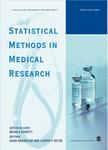版权所有:内蒙古大学图书馆 技术提供:维普资讯• 智图
内蒙古自治区呼和浩特市赛罕区大学西街235号 邮编: 010021

作者机构:Univ Islam Indonesia Dept Informat Sleman Indonesia Radboud Univ Nijmegen Inst Comp & Informat Sci Nijmegen Netherlands Radboud Univ Nijmegen Med Ctr Dept Nephrol Nijmegen Netherlands Netherlands Inst Hlth Serv Res Utrecht Netherlands Univ Amsterdam Acad Med Ctr Dept Med Psychol Amsterdam Netherlands
出 版 物:《STATISTICAL METHODS IN MEDICAL RESEARCH》 (医学研究统计方法)
年 卷 期:2018年第27卷第12期
页 面:3814-3834页
核心收录:
学科分类:0710[理学-生物学] 1204[管理学-公共管理] 02[经济学] 0202[经济学-应用经济学] 020208[经济学-统计学] 1001[医学-基础医学(可授医学、理学学位)] 07[理学] 0714[理学-统计学(可授理学、经济学学位)] 070103[理学-概率论与数理统计] 0701[理学-数学]
基 金:DGHE of Indonesia European Community's Seventh Framework Programme (FP7/2007-2013) Alzheimer's Disease Neuroimaging Initiative (ADNI) (National Institutes of Health) [U01 AG024904] DOD ADNI (Department of Defense) [W81XWH-12-2-0012] National Institute on Aging National Institute of Biomedical Imaging and Bioengineering AbbVie Alzheimer's Association Alzheimer's Drug Discovery Foundation Araclon Biotech BioClinica, Inc Biogen Bristol-Myers Squibb Company CereSpir, Inc Cogstate Eisai, Inc Elan Pharmaceuticals, Inc Eli Lilly and Company EuroImmun F Hoffmann-La Roche Ltd Genentech, Inc Fujirebio GE Healthcare IXICO Ltd Janssen Alzheimer Immunotherapy Research & Development, LLC Johnson & Johnson Pharmaceutical Research & Development LLC Lumosity Lundbeck Merck Co., Inc Meso Scale Diagnostics, LLC NeuroRx Research Neurotrack Technologies Novartis Pharmaceuticals Corporation Pfizer, Inc Piramal Imaging Servier Takeda Pharmaceutical Company Transition Therapeutics Canadian Institutes of Health Research
主 题:Longitudinal data causal modeling structural equation model stability selection multi-objective evolutionary algorithm chronic fatigue syndrome chronic kidney disease Alzheimer's disease
摘 要:A typical problem in causal modeling is the instability of model structure learning, i.e., small changes in finite data can result in completely different optimal models. The present work introduces a novel causal modeling algorithm for longitudinal data, that is robust for finite samples based on recent advances in stability selection using subsampling and selection algorithms. Our approach uses exploratory search but allows incorporation of prior knowledge, e.g., the absence of a particular causal relationship between two specific variables. We represent causal relationships using structural equation models. Models are scored along two objectives: the model fit and the model complexity. Since both objectives are often conflicting, we apply a multi-objective evolutionary algorithm to search for Pareto optimal models. To handle the instability of small finite data samples, we repeatedly subsample the data and select those substructures (from the optimal models) that are both stable and parsimonious. These substructures can be visualized through a causal graph. Our more exploratory approach achieves at least comparable performance as, but often a significant improvement over state-of-the-art alternative approaches on a simulated data set with a known ground truth. We also present the results of our method on three real-world longitudinal data sets on chronic fatigue syndrome, Alzheimer disease, and chronic kidney disease. The findings obtained with our approach are generally in line with results from more hypothesis-driven analyses in earlier studies and suggest some novel relationships that deserve further research.